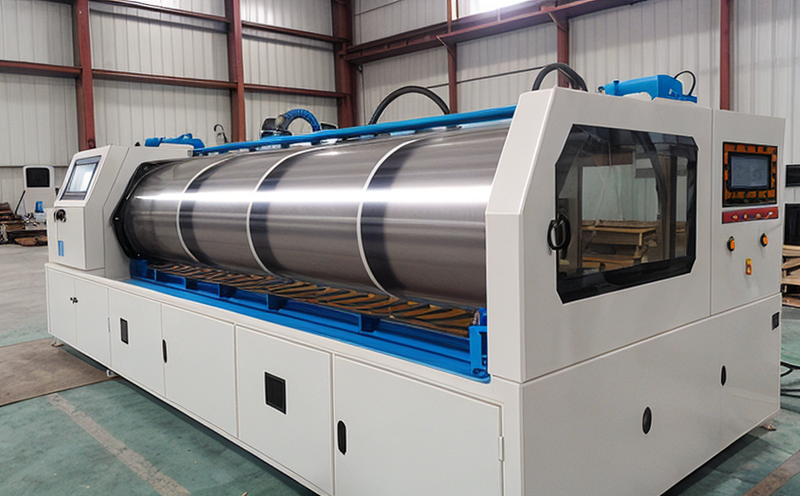ASTM D3389 Coated fabrics Abrasion resistance Taber method
The Taber abrasion test (ASTM D3389) is a standardized procedure designed to measure the abrasion resistance of coated fabrics. This test simulates real-world wear and tear by subjecting the fabric sample to repeated frictional forces, which helps in assessing its durability under various conditions.
This method uses the Taber Abrader machine, an apparatus that consists of two wheels rotating at a specified speed. The wheels are positioned vertically above the sample, and they rub against it continuously while the sample is subjected to a load. The test duration can range from 100 to 2500 cycles depending on the fabric’s expected performance in real applications.
The specimen preparation involves cutting rectangular pieces of the coated fabric according to ASTM D3389 specifications, ensuring that they are free from defects and consistent with the production batch. The samples must also be conditioned prior to testing by drying or humidifying them to specific humidity levels before placing them on the Taber Abrader.
The test results indicate how much weight loss occurs after the specified number of abrasion cycles. Weight loss is directly correlated with the fabric’s resistance to wear, and lower values suggest better performance. The data obtained from this test can be used by quality managers to ensure that the materials meet regulatory standards and customer expectations.
For industries such as automotive, medical device manufacturing, and aerospace, where fabrics are subjected to continuous frictional forces, ASTM D3389 provides a reliable method for selecting appropriate materials. By employing this standard test, companies can optimize their product designs, improve longevity, and enhance user experience.
- Customer satisfaction is significantly enhanced when products perform as expected in real-world conditions.
- The Taber abrasion test ensures that coated fabrics meet stringent quality control criteria.
- Companies can use the results to improve material selection and product design.
In summary, ASTM D3389 plays a crucial role in ensuring that coated fabrics possess adequate resistance against abrasive wear. This standard is essential for industries reliant on durable materials that must withstand prolonged frictional forces without degradation.
Why It Matters
The importance of ASTM D3389 cannot be overstated, especially in sectors where the integrity and longevity of coated fabrics are paramount. For instance, in automotive interiors, the seating materials need to withstand continuous friction from the body weight of passengers over years of use without showing signs of wear. The Taber abrasion test provides a standardized way to assess such durability.
In medical device manufacturing, where patient safety is non-negotiable, ensuring that the fabrics used in sterilization bags or other components do not degrade under repeated handling and exposure to sterilizing agents is critical. ASTM D3389 helps manufacturers verify that their materials will maintain integrity throughout the product lifecycle.
For aerospace applications, where lightweight yet durable materials are essential for reducing weight without compromising safety, this test ensures that selected coated fabrics can endure the rigors of space travel and re-entry into Earth’s atmosphere. The results from ASTM D3389 help engineers select materials that meet these stringent requirements.
The Taber abrasion test is not just about compliance; it's also a tool for innovation. By understanding how different factors such as fabric composition, coating type, and application duration affect the abrasion resistance, companies can develop new materials with enhanced performance characteristics. This knowledge translates into better products, higher customer satisfaction, and competitive advantage in the marketplace.
Furthermore, ASTM D3389 helps in establishing consistent quality across production batches by providing a uniform method for testing. This consistency is crucial for maintaining brand reputation and ensuring that every product meets the highest standards of reliability and performance.
Industry Applications
The ASTM D3389 test finds extensive use across various industries due to its ability to accurately measure the abrasion resistance of coated fabrics. Some key applications include:
- Automotive Industry: Ensuring that interior materials, such as upholstery and trim components, can withstand the wear and tear experienced by passengers over time.
- Military & Aerospace: Selecting durable materials for aircraft interiors, protective clothing, and other components exposed to harsh environmental conditions.
- Medical Device Manufacturing: Verifying that sterilization bags and other critical components maintain integrity under repeated handling and exposure to sterilizing agents.
- Furniture Manufacturing: Evaluating the durability of upholstery fabrics used in high-traffic areas, ensuring long-lasting comfort and appearance.
In each of these sectors, the Taber abrasion test is instrumental in selecting materials that not only meet regulatory requirements but also provide superior performance. This ensures that products not only last longer but also perform better under real-world conditions.





